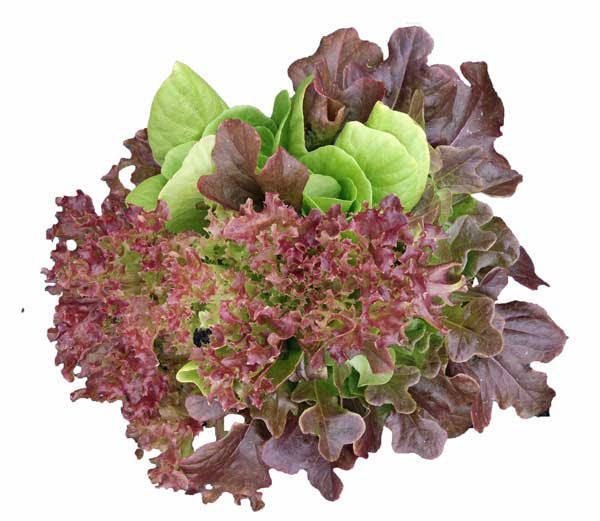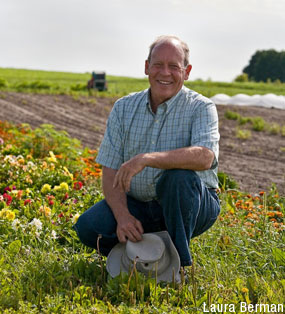Newsletters

It’s never too late for this New Year’s Pledge
If your New Year’s resolutions have lapsed, here is one more opportunity to substantially improve your farm business. The Agri-food Management Institute, Farm Management Canada and Growing Forward 2 have all joined to inspire more farmers to upgrade their business practices. The most successful (in terms of both profit and family time) were recently identified in an extensive study of large and small farm businesses conducted by Ipsos Reid Research. Keys to their success in order of importance are:
- Commit to continue seeking new information and opportunities
- Have up-to-date financial information for perceptive management
- Know costs of production to utilize in decision-making
- Regularly work with business advisors and consultants
- Have a formal business plan that is updated annually
- Prepare a budget then monitor it for projecting cash availability
In my years of consulting with ecological farmers, I have observed that they are all very good growers (because they never stop learning about what they love). But they are generally challenged due to failing to keep financial records up-to-date, do not accurately know their full Costs of Production, unable to anticipate cash availability, don’t appreciate that an advisor’s goal is to provide more value than they charge, and have not yet prepared a Business Plan. (The Ipsos study discovered that only 26% of farmers have a Business Plan!) Utilizing these “best practices” leads to improved financial ratios with reduced workload.
Final applications for GF2 Funding
Growing Forward 2 (GF2) generously provides 50% cost share funding for all these best practices for both farmers and food processors. February 23rd and June 1st, 2017 are the last intake dates to apply this funding. If you are looking for assistance with purchasing innovative equipment, you should first complete a Plan or Assessment for an independent confirmation that this equipment will significantly benefit your food or fiber business. Please call me right away if you have questions. (Be aware that GF3 may not start until mid 2018.)
Case Study of one of my Clients
In 2012, Ian Adamson was growing and selling microgreens, tomatoes, salad greens and herbs. Customers loved his products along with their consistent quality and availability. Since banks would not lend to such a precarious new agricultural enterprise, some customers actually lent money to help boost production. But as he had expanded too quickly for his available working cash, payables remained precariously overdue while he and his wife survived on a meager draw. Ian asked for my help.
The first thing I did was set up a budget and standardized chart of accounts so he could have reasonable Cash Flow Projections inform his creditors when they could be paid. Then I calculated the full Costs of Production so he would know which products to promote, which ones to boost prices, and which to cease production. In order to concentrate on the higher margin microgreens he stopped growing salad greens, tomatoes and herbs,. Profits quickly increased. With the business stabilized, we could prepare a formal Business Plan and develop a strategy for future growth. Growing Forward 2 (GF2) provided cost share support for developing all these business management tools. York County Conservation, Ontario Hydro, Enbridge Gas, Greenbelt Foundation, and AgriInnovation, along with GF2 continued cost share supports for:
- Organic soil blending equipment to eliminate nutrient runoff into the local watershed
- Market Research to confirm the primary reasons customers were selecting his products
- Website Development to clearly inform customers how Greenbelt Microgreens provides value
- Point of Sale Marketing posters, tastings, and branded labels for informative presentations
- LED Lighting for energy savings that also produced healthier plants and longer shelf-life
- High efficiency boiler and energy curtains for both winter and summer energy savings
- Food Safety food-grade equipment and training to enable certified sales to supermarkets
- Seeding and Harvesting machines developed with equipment manufacturers for efficiency and quality
- Acrylite roofing for improved insulation and wider spectrum light for more flavourful, healthier, and colourful plants
With a solid Business Plan in hand, Ian was able to speed up his growth curve with a BDC loan and equipment leases. In only five years, he tripled sales, paid all overdue debts, and became able to bring home a reasonable salary. Plus, the business received a Premier’s Award for Agri-food Innovation Excellence! The business is at last in a position to afford a return to producing exceptional local salad greens.

I dissuaded Ian from signing the extraordinarily one-sided Vendor Buying Agreement required by supermarkets. After presenting them with pages of objections, followed by a couple years of frustrating negotiations, he now has an equitable agreement. Ian went through this aggravation to benefit all other organic and local growers.
In keeping with the new Canadian Organic Standards that no longer permit hydroponic production, Ian has enhanced his soil-mix’s inherent fertility by inoculating it with beneficial biological activity (rather than maintaining the recommended sterility). This has actually resulted in reduced plant diseases along with adding more flavour, colour and shelf-life than imported hydroponic organic salad greens. I have also arranged for him to donate excess soil-mix to local non-profit organizations that train new organic farmers.
New Interest in Soil Health
Organic farmers have been actively concerned with the biological aspects of healthy [productive] soil since the beginning of the movement. Last November I was invited to an Ontario Ministry of Agriculture Soil Health Forum. I was apprehensive about understanding presentations by so many PhD’s, but with my SR&ED experimental research on soils, all was easily understandable. I was quite surprised by the mentions of various disturbing problems arising from conventional agriculture. (Two professors even intimated it may be time to jettison the standard NPK fertility paradigm.)
At an EFAO Conference a few days later, there were of course many soil health workshops: composting, reduced tillage, cover cropping, mob grazing, regenerative agriculture, soil biology testing, and soil food webs. I took the opportunity to speak with Jeff Moyer, Executive Director of Pennsylvania’s Rodale Institute, that was founded in 1947 to study the link between healthy soil, healthy food and healthy people. I told him about the sudden interest in soil health by the Ontario government; to which he replied that the same thing is happening in several US states. He is not sure of the motives for this newfound interest, so prays this is a positive development.
ALUS Canada (Alternative Land Use Services) was founded in 2006 to provide a network for governments, foundations, corporations and individuals to provide farmers with financial incentives to expand their healthy ecosystem services. These services include clean air, clean water, flood mitigation, climate adaptation, carbon sequestration, and species at risk habitats. Healthy soils naturally benefit everyone.

The Hidden Life of Trees
I have been intrigued by stories about British Colombia’s mature trees helping their saplings by sending nutrients and guidance through the “wood-wide web” of fungal roots. So I went to a bookstore to pick up a copy of The Hidden Life of Trees: What They Feel, How They Communicate. It was not to be found in the expected sections, so a clerk kindly told me it could be found in the Best Sellers section. Wow, interest in healthy soil and plants has risen to a whole new level!
Those of us who regularly observe the magic of plants interacting with the mysteries of soil, appreciate the social networking of trees described in this book is completely plausible. Somewhat similar research at the University of Guelph was done with how soybeans use the colour of light to interact with competition.
Late Winter Conferences
Unfortunately, two of the more interesting and intimate conferences had to be scheduled on the same day this year. Chapters of Canadian Organic Growers (COG) are sponsoring both. Whether you are a farmer or a consumer or a chef, please support COG by becoming a member and attending one of these conferences.
COG Toronto is hosting its 11th Annual Consumer Conference on February 25 at the University of Toronto Conference Centre. As in previous years, there will be many international consumer oriented experts and a fine luncheon. Click on the Speakers and Agenda buttons at the bottom of the webpage for detailed information.
COG Ottawa is hosting Eco Farm Day on February 25 and 26 at the Ramada Inn in Cornwall, Ontario. This farmer oriented conference will be highlighted by Restoration Agriculturist Mark Shepard. He has most successfully determined how to follow the principles of Permaculture and Biodynamics to create profitable paradigms to ecological farms. Mark will be the keynote speaker on Saturday; then provide a full-day workshop on Sunday.
Georgian College is hosting its Central Ontario Agricultural Conference on March 3 and 4 at the Barrie Campus. On Friday there will be modules for field crops, sheep and dairy; and on Saturday the emphasis will be organics, backyard farming, and horses.
10 Food Trends for 2017
My take on this year’s trends is not so much about specific ingredients, but about general lifestyle changes:
- Fresh fruits and vegetables will continue to replace processed artificially flavoured products. This healthier lifestyle will replace dieting.
- Soups made with delicious broths will be convenient and satisfying. They will be made less expensive and more nutritious by sneaking in healthy root vegetables and leafy greens.
- Fizzy beverages flavoured with summer fruits and vegetables or fresh herbs are refreshing and the water dilutes any sugars.
- Fear of fats will continue to decline as people discover that fat does not lead to weight gain. Instead, it provides lasting satiety that reduces desires for nibbling rich between meal snacks.
- Reducing waste will be accomplished by more frequent shopping for more minimally packaged ingredients. Consumers are discovering that more flavourful ingredients are more likely to be eaten before they spoil.
- Consumers will become more comfortable with the higher prices forecast by Dalhousie University’s Canada Food Price Report 2017. Fresh produce and meats will rise 4-6% (though dairy and eggs and processed foods will rise less than 2%).
- Interest in prebiotics – foods with soluble fiber (that feed probiotics in the gut) such as chicory, Jerusalem artichokes, garlic/leeks/onion, leafy greens, asparagus, dried beans/lentils, oatmeal, apples, nuts, bananas, and olive/sunflower oils.
- Interest in probiotics – foods with still living bacterial ferments such as yogurt, kefir, sauerkraut/kimchi/pickles, vinegar, kombucha, miso, and cheese.
- Insects. (Though I doubt many Westerners are ready for this.) However, we do like the results when they are fed to hens, chickens, pigs and cattle. Entomo Farms of Peterborough, Ontario is already the world’s largest producer of crickets and mealy worms outside of China.
- Once again, most prognosticators are forecasting the demise of kale. As long as growers refuse to sell under-watered bitter leaves, the trend for kale should continue. Cornell University is currently breeding some more appealing varieties.
To view previous Newsletters ...
My past newsletters may be seen by clicking here.

